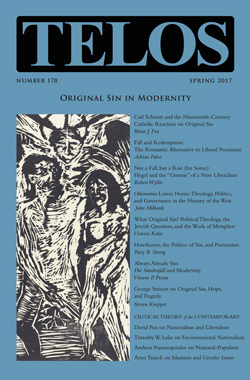Steven Knepper’s “George Steiner on Original Sin, Hope, and Tragedy” appears in Telos 178 (Spring 2017), a special issue on “Original Sin in Modernity.” Read the full article at the Telos Online website, or purchase a print copy of the issue in our online store.
 At the beginning of his 1961 study The Death of Tragedy, George Steiner claimed that Christian “optimism” contributed to the demise of tragic drama in modernity. The ensuing chapters of The Death of Tragedy actually offer a more nuanced account, though, in which Steiner finds tragic potential in the doctrine of original sin. In subsequent essays, Steiner has doubled down on his claim that tragedy must be bleak. Indeed, he now holds up an ideal of hopeless “absolute tragedy.” In these later writings, Steiner has also continued to show interest in original sin, even claiming in a 2004 essay that original sin is the core of tragic art.
At the beginning of his 1961 study The Death of Tragedy, George Steiner claimed that Christian “optimism” contributed to the demise of tragic drama in modernity. The ensuing chapters of The Death of Tragedy actually offer a more nuanced account, though, in which Steiner finds tragic potential in the doctrine of original sin. In subsequent essays, Steiner has doubled down on his claim that tragedy must be bleak. Indeed, he now holds up an ideal of hopeless “absolute tragedy.” In these later writings, Steiner has also continued to show interest in original sin, even claiming in a 2004 essay that original sin is the core of tragic art.
“George Steiner on Original Sin, Hope, and Tragedy” traces these developments in Steiner’s thought, arguing that the emphasis on original sin in his later writings does not signal a reconciliation between Christianity and tragedy, since Steiner ultimately defines original sin as ontological alienation—a formulation closer to Gnosticism than to traditional Christian belief. This article also questions the ideal of “absolute tragedy,” arguing that tragedy requires some bare possibility of hope. The article ultimately finds Steiner’s 1961 study to be more compelling than his later essays on tragic drama, but it also points to the ending of Steiner’s 1989 masterwork Real Presences. Here Steiner seems to acknowledge the basic necessity of hope, perhaps revealing an untaken road in Steiner’s thought on tragic drama.



